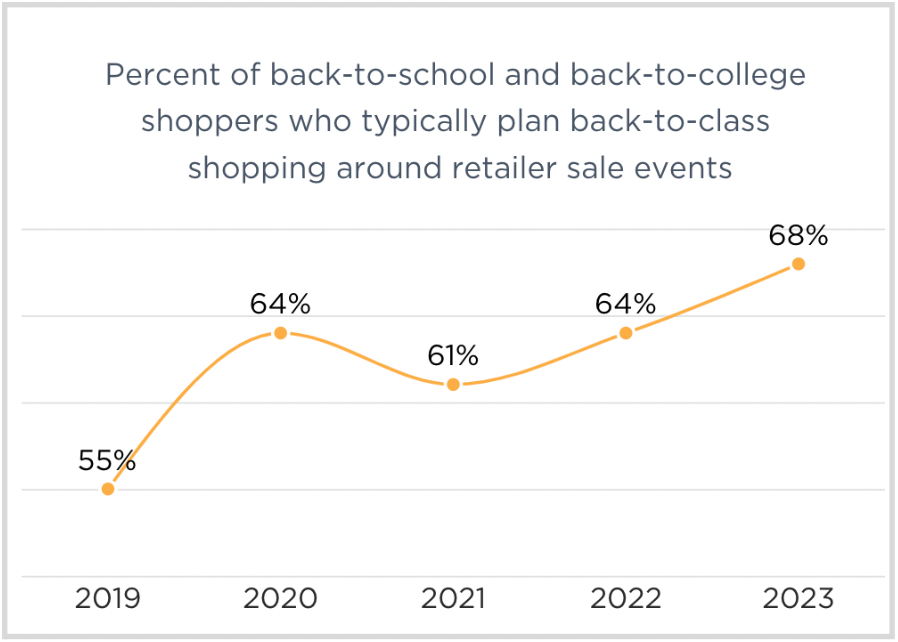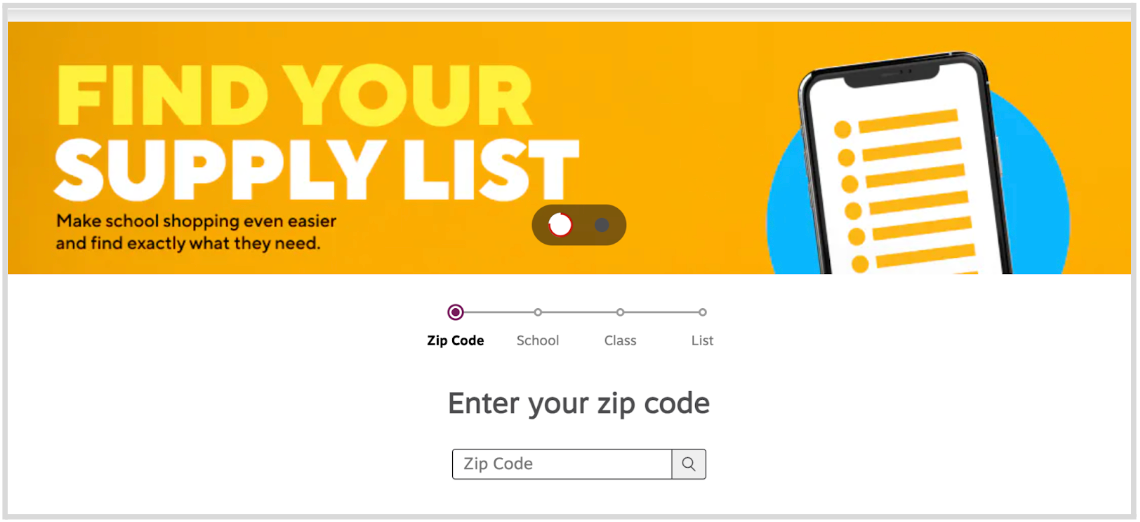Back-to-school shopping means peak selling season for many retail store owners. It’s the time of year when students of all ages get ready for a new year, and retailers of all sizes prepare for an uptick in sales.
Whether you’re selling Crayola to kindergarten parents or dorm room essentials to freshmen, we’re here to help you ace your back-to-school strategy. Find out predictions for the 2023 back-to-school sales season and how to tap into the trends.
When does back-to-school shopping start?
People begin back-to-school shopping in July. Summer vacation may have only just started, but shoppers are already thinking about what they need to purchase for next semester.
Back to school is the second-largest retail season after the winter holidays. In 2022, total spending hit $36.9 billion, with the average household spending $864.
If you haven’t launched your back-to-school marketing and promotions yet, don’t worry, there’s still time—most parents aim to have their shopping done by August 15.
The key to preparing for a successful back-to-school shopping season is effective inventory management. If you understock, you risk missing out on sales. While if you overstock, you may end up with excess inventory that’s hard to sell.
How do you know how much inventory to stock? Review last year’s sales data and take a look at our predictions for this year’s season.
Spotlight on back-to-school season 2023
Before determining your back-to-school marketing strategies, make sure you know what to expect from this year’s retail holiday.
Let’s take a look at the major back-to-school shopping trends of 2022, and how 2023 is shaping up.
In a recent National Retail Federation (NRF) webinar, Mark Mathews, VP of research development and industry analysis, explained how the US economic landscape is likely to impact back-to-school shopping in 2023.
“Necessities are the most protected segment of retail,” Mathews said. “And getting kids to school is essential for families. Consumers are cutting back on spending in other areas, working additional hours, and taking other measures to cover costs for back-to-class shopping this season.”
Prices will be a factor this season, as 80% of people expect to see higher costs when back-to-school shopping this year. With concerns around the US economy, back-to-school and college shoppers are looking for ways to make their budget go further so students have everything they need for the first day of class.
For example, nearly half of shoppers are doing more comparative shopping online. Close to half are shopping for sales more often, while four out of 10 are buying more store brand or generic products.

Nearly 70% of shoppers planned to shop online for events like Prime Day and sales like Labor Day.

Despite worries about inflation and other economic woes, consumers aren’t pulling back on back-to-school spending. The NRF predicts this year’s back-to-school spending will be equal to last year’s record-breaking figures and surpass pre-pandemic highs.
It’s not just inflation that accounts for this year’s back-to-school increase. Spending has outrun inflation in recent years. Categories like furniture, electronics, and others have experienced inflation ranging from 2% to 22% since 2019, but overall back-to-school spending grew by 36%.
Back-to-class shopping continues to start early—nearly six out of 10 shoppers had started shopping as of early July.
This could be due to a number of factors, including maximizing their budget, planning for potential product delays, or taking advantage of promotions.
Back-to-class shopping isn’t done yet. In early July, 88% of consumers said they were waiting for their supplies list, and 42% expected to receive theirs by the end of the month.
4 tips to sell more during back-to-school season 2023
Ready to have your best back-to-school retail season yet? Try out these four tips.
1. Tap into social media
Promoting your back-to-school offerings on social media is not a novel idea. But knowing how to optimize your social media channels is key to success.
Thirty-five percent of online back-to-school shoppers use social media to find products and sales. Half of millennial parents do back-to-class shopping on their mobile devices. While parents do have a supplies list to shop from, 57% of US parents say their kids influence their back-to-school purchases.
There’s plenty of opportunity to reach both influential kids and their parents while they’re scrolling social media.
Focus on showcasing your top products for back-to-school shoppers, as well as any promotions you might be running. To get the biggest return on investment (ROI) for your social media activities, consider which platforms your target audience visits.
“TikTok’s appeal and expanding popularity make it a great channel to help brands and retailers engage with Gen Z and younger parents by starting their own challenges or hashtags,” says Brittany Steiger, senior retail and ecommerce analyst at Mintel.
For example, Shopify merchant and backpack brand Brevite uses TikTok to share a humorous take on a waterproofing test of its backpack against a competitor’s. It’s a fun way of engaging its TikTok audience and getting them to think about their back-to-school shopping.
Even though Facebook might not have the same new and young feel as TikTok or Instagram, it still has widespread appeal—70% of US adults use Facebook.
Facebook is the favorite social platform of the 35 to 44 age demographic. If your target market includes parents in this age group, Facebook is an important place to target in your campaigns.
Armed with this knowledge, tap into Facebook’s highly targeted ad network, where you can run a Facebook ad campaign according to the demographic you’re after (and according to your budget).
2. Run promotions
Three out of 10 consumers are using coupons more this shopping season.
Appeal to these budget-conscious shoppers with special deals and promotions during the back-to-school season. Your goal is to attract as much attention as possible, so consider bundling promos like buy-one-get-one (BOGO) deals, gift-with-purchase offers, or hosting a contest.
You could also use social media for your giveaway. Prompt customers to post an item from your shop on Instagram with a hashtag like #firstdayofschool to get 15% off their total purchase. By posting a picture of your product in use, it enters the shopper into a giveaway for the chance to win a gift card.
This is a fun way to offer a promotion while you benefit from extra exposure on social media.
3. Offer different shipping and delivery options
Seventy-seven percent of parents say convenience is more important than price when back-to-school shopping. Make your brand the obvious choice when it comes to ease of shopping by offering multiple shipping and delivery options.
Consider offering free shipping for orders above a certain threshold as well as other options like buy online, pickup in-store (BOPIS).
You could also bundle your bestsellers and back-to-school essentials together to make it easier for shoppers to find what they’re looking for.
For example, you could create a school supplies list of everything shoppers need to get in time for the school year.
Stationery and office supplies retailer Staples has a search feature that lets parents or children find their school’s back-to-school checklist. All shoppers need to do is enter their ZIP code to find their school and class supply list. Teachers can also add their school’s list to the site.

Staples also lets shoppers browse supplies by grade. When parents or students click through, they can scroll through a list of different products tailored to the grade range.
4. Collaborate with influencers to promote school supplies
Working with a few influencers or user-generated content (UGC) creators can help build trust and credibility with your target audience. In one study, 87% of participants said when choosing a product, they pick one recommended by an influencer.
The partnership doesn’t needn’t be complex, either. For example, the collaboration could include the creator publishing a TikTok and Instagram Reel for a previously agreed upon rate.
Caption: Working with creators to showcase your products on platforms like TikTok and Instagram can help you reach more customers.
The creator’s rate will depend on the size of their following and reach. But in 2023, you can expect to pay $100 per 10,000 followers for an Instagram post.
Choose an influencer that interacts with your target niche. Whether they’re mommy bloggers or younger influencers popular with teens or college kids.
Try searching for influencers on TikTok and Instagram with relevant hashtag searches, or run a quick Google search. You can also use Shopify Collabs to find influencers to partner with.
Master back-to-school season
Back-to-school shopping season is often a highlight in retailers’ calendars. And as consumers look to shop increasingly earlier and budgets remain healthy, retailers should look to maximize their 2023 sales.
Try out some of our tips and experiment with what works best for your customers. Remember, the key to a successful back-to-school season is to start planning early.
Back-to-school shopping FAQ
How much do people spend on back-to-school shopping?
What are the most purchased back-to-school items?
The most purchased back-to-school items typically include these supplies:
- Notebooks, ring binders, and paper
- Pens, pencils, and erasers
- Highlighters, sharpies, and ballpoint pens
- Backpacks and lunchboxes
- Post-it notes, planners, and pencil cases
- Textbooks and reading materials
- Clothing and shoes
- School backpacks
- Electronic devices, such as laptops, tablets, and calculators
- Art supplies, like markers, crayons, and colored pencils
What does back-to-school shopping mean?
Back-to-school shopping refers to the process of purchasing supplies, clothing, and other essentials for students before the start of a new academic year. This typically takes place in late summer or early fall, as parents and students prepare for the upcoming school year.
What are back-to-school shoppers spending the most money on?
Back-to-school shoppers tend to spend the most money on:
- Electronic devices, such as laptops, tablets, and calculators
- Clothing and shoes
- Textbooks and reading materials





